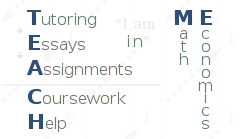Section 24: Problem 7 Solution
Working problems is a crucial part of learning mathematics. No one can learn topology merely by poring over the definitions, theorems, and examples that are worked out in the text. One must work part of it out for oneself. To provide that opportunity is the purpose of the exercises.
James R. Munkres
(a) "Order preserving" implies "injective". Therefore,
is bijective. Order preserving also implies that
preserves the order topology.(b) It is increasing from
to
(this part may require using the intermediate value theorem if it was not proved before), therefore, it is order preserving and surjective and, by (a), homeomorphism. Therefore, its inverse is continuous.(c)
is obviously increasing and surjective. In the order topology on
would not be open, while it is open in the subspace topology. Therefore,
would be a homeomorphism had
the order topology, but in the subspace topology there are too many open sets in
which makes
not continuous:
is open in the subspace topology (not in the order topology) but
which is not open in
.
